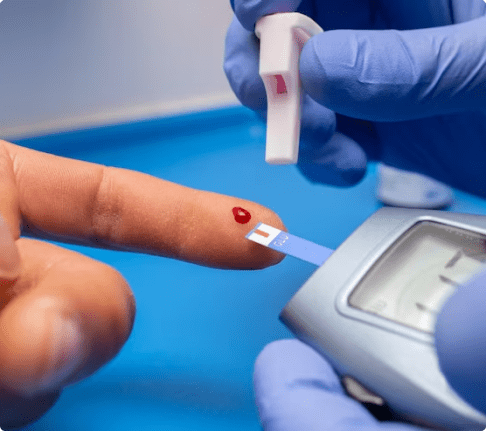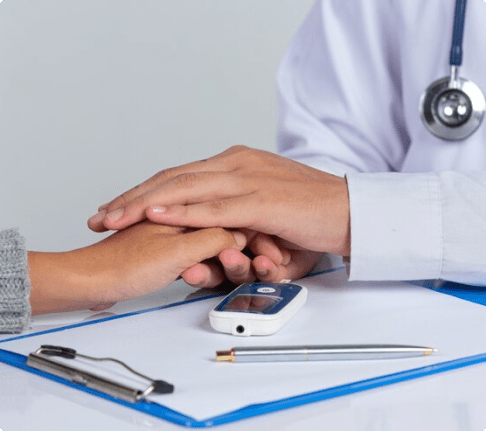- Visiting Hours: Mon-Sat / 8:00 AM - 8:00 PM
- Visiting Hours: Mon-Sat / 8:00 AM - 8:00 PM
Type 1 diabetes refers to a condition where the body produces no insulin, or very little. It is an autoimmune disease, meaning the body’s immune system (that fights infections and keeps us healthy) attacks the pancreatic cells that produce insulin.
Insulin helps to move glucose—or the sugar absorbed by the body from the food we eat—from the blood to the cells. Here, the glucose is used by the body for energy production. Thus, without insulin, the sugar accumulates in the blood and causes various problems, leading to diabetes.
Type 1 diabetes has a genetic link and is seen in fewer people (only 10-15% of people with diabetes have type 1), but its onset is usually earlier. Symptoms appear during childhood or the teenage years and can progress rapidly within a few weeks. To be managed, the condition requires the individual to take continuous insulin supplementation. Thus, Type 1 diabetes affects the way the body processes sugar, requiring lifelong treatment.





Type 1 diabetes often presents in early adolescence with abrupt onset symptoms due to a rapid decline in insulin production. The common Type 1 diabetes symptoms include:
In advanced cases, individuals can present with diabetic ketoacidosis (DKA), characterized by abdominal pain, nausea, vomiting, and fruity-smelling breath.
It is essential to recognize the symptoms and seek immediate care, especially in children and young adults. Prompt medical attention is crucial to prevent life-threatening complications. An early diagnosis can be sought through blood tests measuring glucose and other biomarkers.



An autoimmune disease, Type 1 diabetes is caused when the body’s immune system, which usually fights infections, marks the insulin-producing pancreatic cells as foreign bodies. It attacks and destroys the cells, disrupting and halting insulin production in the pancreas. Without insulin to guide blood glucose into cells, the level of sugar in the blood rises rapidly. This condition is termed a hyperglycaemic state and can lead to various short- and long-term effects in the organs, including the heart, kidneys, nervous system, eyes, gums, etc.
In Type 1 diabetes, the body’s immune system attacks and destroys insulin-producing beta cells in the pancreas, leading to absolute insulin deficiency. Insulin replacement therapy is essential for regulating blood sugar levels and preventing complications. Without insulin, the cells cannot absorb glucose, resulting in high blood sugar and metabolic imbalances.


Glucose is the ultimate end product of digestion, ensured by the breakdown of complex carbohydrates by the digestive enzymes from the gut.
This is then used by the cells to produce Adenosine triphosphate (ATP), which is the energy source used by our bodies to perform all processes. Glucose is the primary and best source for producing energy molecules, as carbohydrates are converted quickly, and efficiently, compared to proteins and fats.
Family history is the primary identifiable risk factor of Type 1 diabetes; the other main risk factors are age, genetic inheritance, and ethnicity.
If an immediate or close family member has diabetes, then symptoms of Type 1 diabetes usually appear around the teens. However, recent studies show that rare symptoms and the disease onset can occur at any age




Prevention is always better than cure. We perform routine physical and wellness check-ups to ensure that any disease is detected and treated in its initial stages.



Family history is a critical factor in Type 1 diabetes. An X chromosome-linked genetic inheritance characterizes diabetes, so it usually runs in families.
If an individual’s immediate family member has diabetes, the chances of them getting the disease increase. That is, if you have a mother, father, sister, or brother with diabetes, you are more likely to be diabetic or prediabetic. It is recommended that
The potential complications of Type 1 diabetes include:



Type 1 diabetes cannot be prevented, as it is primarily an immune-mediated and inherited disease. To manage the condition, individuals with Type 1 diabetes can follow a healthy lifestyle, exercise regularly, and strictly regulate their sugar intake.
Type 1 diabetes is a lifelong disease and needs continuous external insulin supply along with other medications as prescribed. It is recommended to focus on reducing adverse effects and stopping the disease progression by adhering to a daily regimen.
A healthy lifestyle is needed to lower blood sugar and maintain body weight, along with regular monitoring of the condition by a diabetologist.
If you know that a close family member has Type 1 diabetes, it is best to consult a doctor as early as possible. It is crucial not to wait for the appearance of symptoms to get medical attention and rule out a diagnosis.
If you notice any symptoms commonly associated with diabetes that persist for a week or more, contact your doctor immediately and take the appropriate laboratory tests as recommended.





The leading cause of diabetes is the inability of the pancreas to produce insulin. So, the primary treatment for diabetes is supplying the body with insulin to process the sugar in food. This external insulin supply can be provided in several ways, such as injections and insulin pumps. Individuals with diabetes can also access long-term blood sugar monitoring systems, which use sensor patches on the skin to detect when and what dose of insulin is required.
The most critical steps for diabetes management involve changes in diet and lifestyle and include the following:



For individuals managing Type 1 diabetes, maintaining low blood sugar levels is crucial. The best diets for Type 1 diabetes focus on regulating blood sugar while ensuring balanced nutrition. Some widespread dietary changes are:
Carbohydrate counting: This involves low-carb meals or cutting carbs in every meal. Consistency in carbohydrate intake helps manage insulin doses more effectively. The focus is on consuming whole grains, fruits, vegetables, and legumes that are digested more slowly.
Mediterranean diet: This emphasizes fruits, vegetables, whole grains, lean proteins (such as fish and poultry), and healthy fats (like olive oil and nuts). This diet can help enhance blood sugar control and cardiovascular health.
DASH diet: Preferred for its effectiveness in lowering blood pressure, the Dietary Approaches to Stop Hypertension (DASH) diet promotes the intake of fruits, vegetables, and lean proteins and eliminating salt. It contributes to better overall health, potentially aiding blood sugar control.
Low-glycaemic index (GI) diet: This diet focuses on foods with a lower impact on blood sugar levels, such as whole grains, non-starchy vegetables, legumes, and certain fruits. It can contribute to more stable blood sugar management.
Consistent meal timing: Regular meals and snacks spaced throughout the day can assist with maintaining steady blood sugar levels, preventing sudden spikes or drops.
Some other diets often considered for diabetes management are weight watchers, paleo, gluten-free, vegan, and alkaline diets. It’s crucial to consult with a registered dietitian or a healthcare professional to personalize a diet plan that aligns with your body’s needs, considering factors like insulin dosage, lifestyle, age, personal taste, co-morbid conditions, and costs.





For individuals with diabetes, daily exercise is recommended, with outdoor exercise preferred over indoor exercise. No one type of physical activity fits everyone, but brisk walking, jogging, running, cycling, swimming, and aerobics are recommended over lifting weights and strength training.
Resistance exercises are also an excellent way to lose weight and burn calories. Regular exercise has benefits for those with diabetes, such as:
The goal of exercise for individuals with diabetes is to keep body weight at the optimum level while also burning calories to maintain blood sugar levels. Indoor activities at the gym and floor-based workouts are not discouraged. However, they have been found to be less effective in controlling weight, especially as most workouts are designed to bulk up and build muscle mass.
No matter the specific exercise regimen, consistency is the key, and intense, high-exertion daily activities for short periods are preferred over low-intensity workouts throughout the day. Engaging in a mixture of physical activities, such as playing sports, walking, lifting weights, etc., can help the mind and body to focus and work different muscle groups while eliminating routine.



All people with diabetes and prediabetes are advised to take blood sugar tests regularly.
All tests and their frequency are decided by a doctor based on the patient’s age, body condition, access to healthcare, and severity of the disease.


Would you like to manage your diabetes better and lead a healthier, normal life?
Take an appointment with our senior diabetologist today!